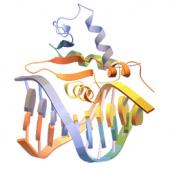
Lab Website:
Email:
Office:
Phone:
Administrative Assistant:
Courses:
Research-at-a-glance:
Affiliations:
Biography:
Angela received her B.A. in Biochemistry and Molecular Biology from Reed College in 1997. There she worked under the guidance of Professor Arthur Glasfeld on structural and biochemical studies of proteins that recognize tRNA or DNA. In 2003, she received her PhD in Chemistry from Harvard University where she worked with Professor Stuart Schreiber to develop novel technologies for identifying and characterizing interactions between proteins and small molecules. Upon graduation, she became an Institute Fellow in the Chemical Biology Program at the Broad Institute and a Group Leader for the NCI Initiative for Chemical Genetics. She is also a Project Leader in the NCI Cancer Target Discovery and Development (CTD2) Center at the Broad Institute aimed at targeting causal cancer genes with small molecules.

Research:
The Koehler lab is focused on building chemical tools and methods for studying temporal aspects of transcriptional regulation in development and disease with a focus on cancer. The lab pursues these goals by discovering and developing direct small-molecule probes of proteins involved in transcriptional regulation such as transcription factors and chromatin modifying enzymes.
Transcription factors that become overactive in disease are promising yet untested targets for therapeutics. For example, these proteins mediate the excessive transcription of genes whose products are required for tumor growth and metastasis. Unlike enzymes, directly modulating the function of a transcription factor requires specific disruption or recruitment of DNA-protein or protein-protein interactions. The discovery or design of small molecules that specifically disrupt or promote these interactions has thus far been a significant challenge and the protein class is often perceived to be ‘undruggable.’ While a handful of successes have been published, the chemical biology community has yet to develop general and systematic strategies for directly modulating the function of transcription factors in cells using small molecules. Our team is developing a general approach to small-molecule probe discovery for transcription factors by coupling direct binding assays with functional assays involving transcriptional and other phenotypic readouts. For example, the group is pursuing compounds that bind and modulate various B-cell master regulators including c-Myc, NF-κB and Pax5.
The group also seeks to identify small-molecule probes of enzymes that regulate the acetylation status of these oncogenic transcription factors. Several transcription factors are non-histone substrates of chromatin modifying enzymes. The mechanistic consequences of acetylation status for transcription factors is not well understood but evidence suggests that these marks affect protein half-life and stable association with chromatin, among other functions. The lab has an interest in identifying small-molecule probes that distinguish between histone and non-histone substrates for deacetylases. The group uses a variety of biochemical and cellular approaches to identify compounds that serve as selective probes of function for specific HDACs or that selectively alter acetylation status of specific transcription factors in cells. Specifically, the lab has an interest in identifying allosteric probes of functions distinct from enzymatic activities, such as protein-protein interactions involving cofactors or other members of the transcriptional machinery.


